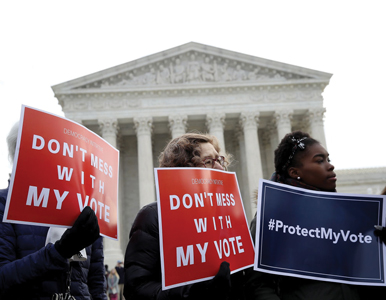
How long? Not long, because the arc of the moral universe is long, but it bends toward justice.
On March 25, 1965, Martin Luther King Jr. addressed more than 25,000 people before the Alabama state capitol—the culmination of a five-day, 54-mile march from Selma to Montgomery to campaign for voting rights for African Americans.
Just hours later, Viola Liuzzo, a white mother of five and a volunteer with King’s Southern Christian Leadership Conference, was murdered by a Klansman on Highway 80 as she ferried a black teenager back to Selma in her ’63 Oldsmobile.
Liuzzo is just one of many Americans who’ve died for voting rights. One year earlier during Freedom Summer, three civil rights workers were murdered while registering black Mississippians to vote. Yet our democratic system guarantees no one—not even citizens—the opportunity to elect a government.
“It’s harder to vote in the United States than virtually every other advanced democracy,” says Allan Lichtman, professor of history in AU’s College of Arts and Sciences. “Because there isn’t a constitutional right to vote, historically, huge segments of the American people were denied voting rights: African Americans, Native Americans, women. Today we don’t have such blanket restrictions, but we have lots of ways in which we impede the right to vote.”
In his new book, The Embattled Vote in America: From the Founding to the Present, Lichtman details the founders’ greatest error—leaving the franchise to the discretion of individual states—and explains why it has triggered a centuries-long struggle over voting rights.
“They loved the people, but not all that much. They distrusted the people,” he says of the constitutional framers, all of whom were white males—mostly elite slaveowners, land speculators, lawyers, and businessmen. “So, they believed that the vote should be limited to those who held property, or at a minimum, paid taxes. They believed only those people, for the most part, had the independence and the strength of mind to resist voter fraud and cast a wise vote.”
Though the founders could have enshrined “economic qualifications” for voting into the Constitution, they worried this would jeopardize a ratification process that needed support from three-fourths of the states. Thus, Lichtman says, they gave states the power over voting—and states used their discretion to limit the franchise to whites.
“Race has always been at the center of voting in America. In the nineteenth century, states either loosened or, for the most part, entirely eliminated economic qualifications, but they moved toward white-only voting,” he says.
After the bloody Civil War, the abolition of slavery, and President Abraham Lincoln’s assassination, the Republican “party of Lincoln” sought to expand voting rights through the 15th Amendment.
But there was a hitch: Since most states still restricted nonwhite voting, Congress determined that an affirmative “you have a right to vote” would never get ratified. “The consensus was that this was going too far,” Lichtman says. “And the best they could do was a prohibition on denying the right to vote on the basis of race.”
Although suffragettes successfully fought for women’s voting rights in 1920, the 19th Amendment is written the same way.
“Since the Constitution, every subsequent amendment is phrased negatively in terms of what states can’t do,” Lichtman says. “So, you can’t deny the right to vote, according to race or gender or age. But to this day, none of the amendments affirmatively define a right to vote.”
It might seem like ancient history, but the battle for the ballot rages on.
In recent years, GOP-controlled state legislatures have pushed for controversial voter ID laws that would protect electoral integrity—but civil rights groups condemn such proposals as discriminatory measures aimed at suppressing the vote.
The Supreme Court also has permitted states flexibility on felon disenfranchisement matters, and it recently upheld Ohio’s voter roll “purge” law. Lichtman expects the High Court to continue allowing rigid voting standards.
“We are at another pivot point in our history where our precious right to vote hangs in the balance,” Lichtman says. “Every American needs to understand that our vote is precarious, and you can only retain your vote and your freedoms by action.”